
An anesthetic approved nearly five decades ago continues to excite researchers. That’s because over the last several years ketamine has revealed new uses never imagined in 1970 when the drug was developed. Investigators discovered that ketamine can provide surprisingly fast anti-depressant activity. Shortly after it is infused, people with suicidal thoughts often report a dramatic shift in mood. Now there is surprising evidence it may help people stop problem drinking.
How Could Ketamine Affect Problem Drinking?
A preliminary study published in the journal Nature Communications reports that a single intravenous dose of ketamine might impact peoples’ drinking behavior (Nov. 26, 2019). The investigators recruited 90 volunteers who acknowledged that they drank a LOT of beer, although they had not been officially diagnosed with alcohol use disorder. None of the participants were trying to reduce their alcohol consumption.
During the first phase of the experiment everyone was shown pictures of beer. Then they each drank a beer. The investigators recorded their reactions, including how much they wanted another beer. The volunteers returned a couple of days later for one of three randomly assigned treatments. One group was shown pictures of beer, as before, and a glass of beer was put in front of them. Before they could drink it, the researchers whisked it away and gave them a shot of ketamine. Another group saw pictures of orange juice, had orange juice served but removed before they drank it, and got a shot of ketamine. The final group also looked at pictures of beer, had beer put in front of them and didn’t get to drink it. They did not get ketamine.
Ketamine Reduced Problem Drinking:
Ten days later, the people in the first group (beer pictures plus removed beer plus ketamine) reported a significant drop in their problem drinking which persisted for nine months. The other two groups also reported drinking much less after nine months, although the initial drop was much less dramatic.
More research is needed to determine if ketamine can actually help people change their problem drinking. The scientists believe that ketamine works by disrupting the maladaptive reward memories associated with alcohol consumption. Breaking that connection might help them drink less.
Citations
- Das RK et al, "Ketamine can reduce harmful drinking by pharmacologically rewriting drinking memories." Nature Communications, Nov. 26, 2019. https://doi.org/10.1038/s41467-019-13162-w

